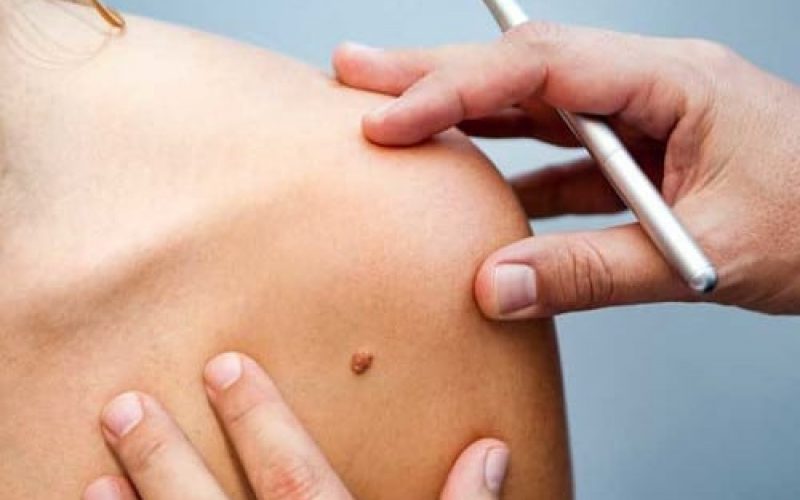Moles, which can appear anywhere on the skin, are common growths that appear when melanocytes (pigment cells) develop in clusters, and vary greatly in their size, shape, and color. Many people choose to have moles removed in order to enhance the appearance of their skin. Although moles are very common and rarely a cause for concern, it’s important to pay close attention to any changes in shape, size or pigmentation of moles – and to seek medical attention to have any suspicious moles examined. When a mole deviates in appearance from a common mole, it may be referred to as an atypical or mole – which is often bigger than a common mole and its shape, color, surface and/or border may appear different.
It’s important to monitor any changes in your moles, and to have your skin checked once a year by a board-certified dermatologist to examine any changes or new growths. At the Dermatology Institute & Laser Center, we are trained in examining moles (which the average patient may sometimes confuse for other dark spots on the skin) and identifying anything that should be more closely observed or further examined to make sure they are not potentially cancerous. We also recommend that people use the “ABCDE” system to look for changes in their moles on their own that should be looked at by a dermatologist, looking for changes in the following characteristics of their moles:
A. Asymmetry—one half does not match the other
B. Border—edges are ragged or blurred
C. Color—uneven shades of brown, black, tan, red, white or blue
D. Diameter—a change in size (usually greater than 6mm, about the size of a pencil’s eraser)
E. Evolving/Evolution (any mole that is changing in appearance)
All moles do not necessarily need to be removed – but if a mole is bothersome to you, or if you don’t like the way it looks, or if there is a chance that it could be potentially cancerous, a dermatologist can safely and effectively remove them through either a surgical excision or surgical shave. Dr. Ros and her team have years of expertise in examining moles and identifying those that are suspicious and require further testing – contact us today at either our Rockaway office or our Clifton office at (973) 472-1000 to schedule an appointment, or email us.
Skin moles are very common. They can come in a wide variety of different shades, shapes, and sizes, and most people have at least a few on their face and/or body. Most moles are completely harmless and not associated with any discomfort, but in rare circumstances, they can be uncomfortable or even cancerous. In addition, some people dislike one or more of their moles for cosmetic reasons.
At Dermatology Institute and Laser Center in Clifton and Rockaway, Dr. Ros and our world-class team specialize in mole removal and can assist you in permanently getting rid of unwanted moles, no matter the reason. To learn more about our precise, cutting-edge techniques, individualized patient care, and consistently excellent outcomes, schedule your initial consultation today!
What Are Moles?
Moles, also known as beauty marks or nevi (nevus singular), are small, common growths that form when melanocytes (pigment-producing cells) group together in clusters. Varying greatly in size, shape, and color, they can appear anywhere on the skin and may occur on their own or in groups. Moles can be flat or raised and may range in color from light skin tones to dark brown or even black. They often develop during childhood and early adulthood but can appear at any stage of life.
In the vast majority of cases, moles are benign and don’t cause any discomfort. Occasionally, however, they may rub or catch uncomfortably on clothing or jewelry. In rare cases, moles may also be an indicator of skin cancer. It’s important to pay close attention to any changes in the shape, size, or pigmentation of moles and seek medical attention as soon as possible to have any suspicious moles examined (see The “ABCDE” System below).
Even if you are not experiencing discomfort on account of your moles and have no reason to suspect that they are cancerous, you may still wish to have one or more of them removed for aesthetic reasons. Cosmetic mole removal can help you boost your self-confidence and achieve a flawlessly even skin tone.
The "ABCDE" System
It’s important to monitor your moles and have your skin checked once a year by a board-certified dermatologist for any changes or new growths. Dr. Ros and the Dermatology Institute and Laser Center team are highly trained and experienced in examining moles and identifying any concerns that should be more closely observed or further examined.
In addition, we recommend that our patients use the “ABCDE” system to look for changes in their moles at home:
- Asymmetry – One half of the mole does not match the other.
B. Border – The edges of the mole are ragged or blurred.
C. Color – The mole contains uneven shades of brown, black, tan, red, white, or blue.
D. Diameter – The mole has undergone a change in size (usually greater than ¼ inch, about the size of a pencil’s eraser).
E. Evolution – The mole is actively evolving in appearance.
If you notice a mole is changing in any of the ways listed above, we recommend booking an appointment at Dermatology Institute and Laser Center right away.
Ideal Candidates
At Dermatology Institute and Laser Center, we work with patients of all ages and backgrounds who wish to have moles removed for an array of different reasons. Ideal candidates for mole removal include those who:
- Have a mole that is changing shape, color, or size
- Suspect a mole may be cancerous
- Are experiencing discomfort on account of one or more moles
- Have aesthetic concerns about the appearance of one or more moles
Treatment Preparation
Surgical removal of a mole is typically considered minor, and very little is usually required in the way of preparation. That being said, Dr. Ros will provide specific instructions tailored to your needs prior to your procedure, which may include avoiding sun exposure, skin irritation, and the use of makeup or certain types of skin products on or near the affected area.
How The Procedure Works
The type of mole removal procedure performed by Dr. Ros will depend on the specifics of your case. Shaving with a specialized razor effectively removes some types of moles, while deeper moles may require surgical excision with a scalpel (moles can grow back if not completely taken out). Dr. Ros will use local anesthesia to numb the surrounding skin, and if a small incision is necessary to remove the entire mole, will close it neatly with tiny sutures. Overall, the procedure should be quick and painless.
Results And Recovery
Once a mole has been entirely removed, it should never grow back, and at Dermatology Institute and Laser Center, our success rates are very high. Downtime after surgical removal of a mole is minimal, and most patients can return to work and their regular routine the following day. If tiny sutures were placed, they are usually removed after approximately a week. By two weeks (or less) post-surgery, most patients have healed entirely, though Dr. Ros may still recommend avoiding direct sun exposure and/or certain skin products for a specified period of time.
About Dr. Adriana Ros
Dr. Adriana Ros is a board-certified dermatologist who has been practicing medical and cosmetic dermatology for more than 15 years. Currently the Chief of the Dermatology Department at Hackensack UMC Palisades Hospital and a staff member at Bergen Regional Medical Center and several other facilities, she possesses the experience and expertise to remove moles surgically using the latest techniques and technologies. Dr. Ros is known for her warm, compassionate patient care and has successfully performed thousands of mole removals as well as other similar procedures, such as skin tag removal and lesion removal, over the course of her career.

Patient Testimonials
Trustindex verifies that the original source of the review is Google. The staff were very friendly and helpful and the waiting room was very clean and comfortable, not to mention that Dr Ross is one of the best dermatologist in North Jersey, I have been a patient of Dr Ross for almost 8 years, she cares so much about her parents health.Trustindex verifies that the original source of the review is Google. I had an appointment with Dr. Adriana Ros for laser treatment of my skin and I’m very satisfied. She was very professional and gave me consultation answered all my questions and her assistant was very attentive and caring towards me, nice and clean office and friendly service. I would recommend Dermatology Institute for everyone!Trustindex verifies that the original source of the review is Google. No wait time (hopefully there will be no wait time next time as well) plus super friendly and professional supporting stuff! The office manager scheduled my daughter to see doctor Ros the next day. Doctor R was very patient with my 3yo, explained everything very well. Definitely recommend her practice!Trustindex verifies that the original source of the review is Google. It was excellent.. all involved in taking care of me was amazing.. Dr Ros is the best! Easy to talk to and explains in detail everything she is going to do. Answers any questions you may have and does not rush you out the door. I highly recommend her!!Trustindex verifies that the original source of the review is Google. * Professional and friendly staff. * Dr. Ros is an amazing dermatologist. She is knowledgeable, friendly, and truly skilled. I couldn’t be happier the care that I received.Trustindex verifies that the original source of the review is Google. Great staff and Dr’s in this location and also North Bergen. I have a very delicate skin condition (perioral dermatitis) and I remember I went to different Dr’s trying to figure out what I had this rash on my face and no Dr could’ve pinpoint the problem. As soon as Dr.Ross checked me, she pinpointed my problem and gave me a solution. I am so thankful for Dr. Ross and the rest of the staff and Dr’s.Trustindex verifies that the original source of the review is Google. Dr Ros was so thorough and compassionate. She took her time, listening to all of my elderly mom's questions and concerns. It was a delicate situation and Dr. Ros was excellent!! Alex prepped my mom before she saw Dr. Ros. Without Alex's suggestion for my mom to get a body check, the hidden pre-cancerous spot might not have been detected and treated. Thank you for the extra care. Mabel was also part of the excellent team. Thank you. If I could, I would give 10 stars!
Book an Appointment Today
Ready to address actinic keratoses and reduce your risk of skin cancer? Dr. Ros and our team of skin specialists at Dermatology Institute and Laser Center are ready to help. Book your appointment today at our Clifton or Rockaway location. We look forward to working with you.



